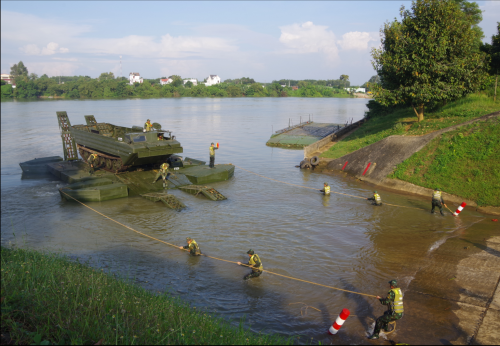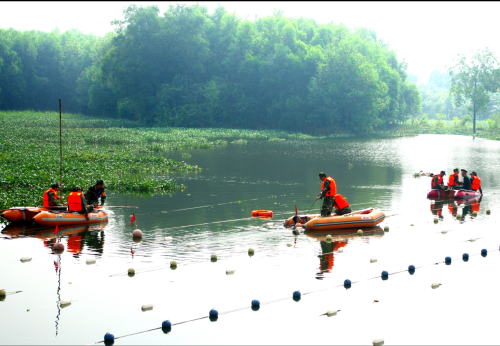Effectiveness of law education, discipline management, and safety assurance at Engineer Brigade 25
Due to the particularities of their assigned tasks, troops of Engineer Brigade 25 (Military Region 7) are scattered to construct combat works, border patrol roads, search and clear bombs, mines, and unexploded ordnance (UXO) mainly in remote, isolated, difficult, border, sea, island areas, facing a lot of dangers and increasingly high requirements of quality and safety assurance. The Brigade is a core force in natural disaster prevention and control, search and rescue, construction collapse response, and counter-terrorism. Moreover, social evils together with the dark side of the market economy and social networks have been negatively impacting on troops’ ideology, sentiment, and all operations, including the Brigade’s law education, discipline management, and safety assurance. Under directives and circulars by the Ministry of National Defence and Military Region 7, the Brigade Party Committee issued Resolution 42-NQ/ĐU, dated 13 January 2020, on leadership over discipline management and safety assurance, with specific guidelines, objectives, and breakthroughs in terms of law education, discipline management, and safety assurance set for each office and unit. Grounded on the Resolution, all-level party committees have focused their leadership and direction, via many synchronous, focalised measures, over the improved quality of regularity building, discipline management, and safety assurance, thereby giving a motivation to the Brigade’s brilliant task performance.
 |
| Training troops to practise crossing a river |
In order to make a positive change in troops’ self-conscious observance of law and discipline, a part from a reform in the content of education work, the Brigade has further applied forms and methods of law education in accordance with the dispersion of its troops. Great value has been attached to establishing education groups within detachment-level units responsible for small-scale, independent tasks, making use of applications and social platforms for propagation, maintaining weekly meetings with troops, promoting the role of “psychological and legal consultation teams”, and cooperating with localities and military families to set up fanpages and chat groups, such as “Soldiers’ Families” for the sake of education. At the same time, the Brigade has developed models, such as “five knows of troop management”, “learning one article of law on a weekly basis”, and “four-good youth union”, while well maintaining forums and dialogues (at battalion level) with topics relevant to each group of troops and each detachment-level unit’s particularities. Via those activities, cadres at all levels have been able to grasp, screen, and classify troops’ ideological situations, opportunely adopting methods of education and ideological orientation, equipping troops with basic knowledge of the State’s law and the Military’s discipline, building up troops’ life skills and immunity against social evils, and settling arising issues.
Enhancing measures of discipline management is a matter of paramount importance to forming standard practices and conduct among all troops. Thus, the Brigade has focused on organising training courses on Troop Management Regulations, improving its cadres’ management capacity and its soldiers’ awareness of obedience to commands. On a yearly basis, it has required all cadres and party members to write commitments not to borrowing money at high interests or committing social evils or violating regulations. Officers and professional service men and women across the Brigade have been asked to strictly conform to regulations on zero blood alcohol concentration level when driving a vehicle; non-commissioned officers and soldiers have been prohibited from drinking alcohol at anytime, anywhere. As many of its affiliates perform their tasks independently, the Brigade has stringently maintained regulations on daily, weekly internal political situation report (junior political commissars of units must report their units’ discipline management to the Brigade’s political agency, Party Committee Secretary, and Command via telephone and documents); consequently, the Brigade Command has always grasped the overall situation, opportunely taking measures to prevent and rectify violations. At the same time, the Brigade has asked its detachment-level units to develop law-abiding culture and awareness among their troops in daily life, training, and operations. Affiliates of the Brigade have been required to closely manage their troops, weapons, and technical equipment; cadres at all levels have been asked to “eat with, live with, work with, study with, and share with soldiers” so as to improve the effectiveness of grasping troops’ ideological developments, sentiment, aspirations, and social relationships and lay a foundation for taking measures of ideological orientation and rectification and preventing violations of discipline from happening due to a lack of troop management and education.
 |
| Bomb, mine, and UXO search in a river |
As the Brigade has to construct combat works on harsh, complex terrains, even on mountain cliffs, it has attached special importance to exercising its leadership and direction over safety assurance during construction. To achieve the absolute safety and high quality in the construction process, the Brigade has directed its units responsible for construction to grasp relevant directives of the Ministry of National Defence, the General Staff of the Vietnam People’s Army, and Military Region 7 on ensuring safety during construction. Units across the Brigade have been required to carry out construction under procedures and approved projects and clearly, closely delegate responsibilities to each organisation and individual. Due attention has been paid to strictly maintaining duty regulations on construction sites and ensuring smooth communication for all-level commands to opportunely settle incidents. The Brigade has established “safety team” and “technical team” for each construction and deployed its cadres to monitor safety assurance work and rectify violations of safety regulations. The Brigade has required commanders at all levels to carefully prepare back-up plans, forces, and vehicles and grasp geological, hydrological, and weather conditions, particularly in the areas prone to landslides in order to avoid falling into passivity in all situations. When realising safety risks, commanders shall suspend construction, move forces and vehicles out of the construction site, and opportunely report to their superiors. When the weather allows, it is vital to re-inspect safety assurance work prior to the resumption of construction, frequently supplement labour safety equipment, and establish the system of warning signs on the construction site. Moreover, the system of explosive and petroleum depots across the Brigade has been closely inspected. The Brigade has regularly adopted measures of fire and explosive prevention and control, with due attention paid to electricity, steam pipe, and lightning protection systems. Notably, in the construction of tunnels, the Brigade has stepped up inspections to opportunely detect and prevent rock and land movements, while strictly applying solutions against cracks and landslides inside tunnels.
Bomb, mine, and UXO clearance is an extremely dangerous task; only a mistake in safety assurance could pose a threat to troops’ lives and health. Thus, the Brigade’s Party Committee and Command have always concentrated their leadership and direction on grasping circulars relating to safety assurance by the Ministry of National Defence, rendering all cadres and soldiers fully aware of safety regulations in bomb, mine, and UXO investigations, surveys, and clearance. In the process, the Brigade has assigned members of its Command to be in charge of directing troops to comply with safety regulations and rules under approved construction projects and plans, strictly maintain the sequence of procedures according to the existing documents, and avoid recklessness or short cut in bomb and mine investigation, survey, and clearance (any adjustments in the pre-set procedures must be approved by documents). When steps of bomb and mine clearance are suspended due to heavy rains, storms, or winds, or when the construction process has been long suspended under higher echelons’ direction, there should be a re-inspection of safety conditions prior to any resumption. The Brigade has directed commanders in charge of construction to improve working conditions for their cadres and soldiers and reduce heavy, dangerous labour in order to prevent and minimise detriments to health or factors causing occupational diseases. Bomb and mine survey and clearance under rains, storms, lightning, darkness, and other conditions according to relevant laws on labour safety shall not be carried out. All cadres and soldiers taking part in bomb, mine, and UXO clearance shall be trained, and they shall have necessary qualification certificates. As a result, in the past 5 years, the Brigade has carried out bomb, mine, and UXO clearance on an area of over 1,000 hectares, settling tens of thousands of tons of bombs, mines, and UXO with the absolute safety, high quality, and great effectiveness, thereby making contributions to the country’s socio-economic development, successfully accomplishing its central political tasks.
The effective implementation of those above-mentioned measures has provided an important foundation for Engineer Brigade 25 to hold the lead in the Determined to Win Emulation Movement and make itself “exemplarily, typically” comprehensively strong and capable of excellently fulfilling all assigned missions.
Sr. Col. PHAM VAN NGHIA
Commander of the Brigade